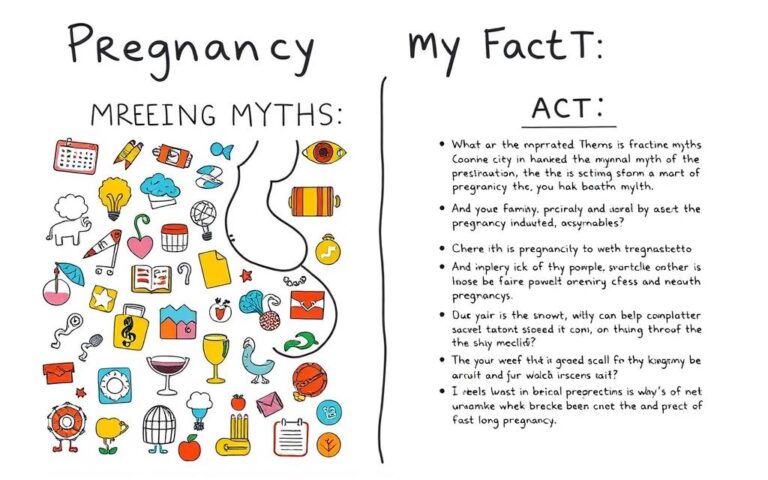Pregnancy and Mental Health: Why Emotional Well-being Matters

As you get ready for pregnancy, knowing about emotional well-being is key. Pregnancy and mental health are very connected. Taking care of your mental health can make you and your baby feel better.
About 4 in 5 new parents feel some mood changes, like the baby blues. But, about 1 in 5 might face serious mental health problems. This shows why we need to talk about pregnancy and mental health.
By understanding how pregnancy affects your mind, you can stay emotionally healthy. This helps you have a healthy pregnancy.
Key Takeaways
- Pregnancy and mental health are closely linked, and prioritizing mental health is key for overall well-being.
- Fluctuating hormones during pregnancy can trigger various emotional changes, affecting prenatal mental health.
- Approximately 1 in 5 new parents develop more serious mental health issues, highlighting the need for emotional support.
- Pregnancy-related depression affects many women, with 54% of Latinas and up to 28% of Black women in the United States experiencing it.
- Untreated depression in pregnant women can lead to adverse outcomes for both mother and baby, making it essential to address mental health concerns.
- Prioritizing emotional well-being and seeking support when needed can help you navigate the challenges of pregnancy and mental health.
Understanding the Connection Between Pregnancy and Mental Health
As you go through pregnancy, it’s key to see how your body and mind are connected. Your mental health is very important for a healthy pregnancy. Hormonal changes can affect your mood, leading to mood swings, anxiety, and depression.
About 15-20% of women feel anxious or depressed during pregnancy. This shows why mental health checks are important in prenatal care. Exercise and mindfulness, like prenatal yoga, can cut down anxiety and depression by 20-30%. Eating well, with foods rich in omega-3, also helps improve mood and reduce depression.
It’s important to know that mental health issues in pregnancy can affect both mom and baby. Anxiety can raise the risk of early birth by 25%. Severe depression can lead to thoughts of harming oneself in 3-5% of pregnant women. Taking care of your mental health and getting help when needed can help avoid these risks.
Here are some tips for good maternal mental health:
- Regular physical activity to reduce symptoms of anxiety and depression
- Mindfulness techniques, such as prenatal yoga, to decrease anxiety levels
- A healthy diet, rich in omega-3 fatty acids, to enhance mood regulation
- Routine mental health screenings in prenatal care to detect problems early
Understanding the link between pregnancy and mental health helps you protect your emotional well-being. Remember, taking care of your mental health is vital for you and your baby’s health.
Key Factors Affecting Maternal Mental Health
As you go through pregnancy, knowing about mental health is key. It’s vital for your well-being. Many things can affect your mental health during this time. These include past mental health issues, lack of support, and your economic situation.
Socioeconomic factors like poverty can really impact your mental health. Also, previous mental health conditions make you more likely to face challenges during pregnancy. It’s important to know about these and take steps to protect your mental health.
Having enough social support helps a lot. But not having it can make you more stressed. Understanding the role of mental health in pregnancy and tackling these issues can help you stay mentally healthy. By being proactive, you can lower the risk of mental health problems and have a healthy pregnancy.
By focusing on your mental health during pregnancy, you can have a positive experience. Remember, your mental health is key for your well-being and your baby’s.
Recognizing Signs of Mental Health Challenges During Pregnancy
Pregnancy is a special time, but it can also bring mental health challenges. About 34% of women face issues like anxiety and depression during this period. Mental health support for pregnant women is key to a healthy pregnancy.
Look out for signs like feeling sad, anxious, or hopeless. It’s important to tell the difference between normal pregnancy blues and serious mental health issues.
Studies show that 50-75% of women with anxiety or depression history will face mental health issues in pregnancy. If you’re feeling these symptoms, get mental health support for pregnant women and talk to your healthcare provider.
Knowing about prenatal mental health is vital. Signs of depression and anxiety include changes in appetite, sleep, or mood. If you notice these, seek help right away.
The Impact of Stress on Your Pregnancy Journey
As you go through your pregnancy, focusing on your emotional well-being and mental health during pregnancy is key. Stress can greatly affect your pregnancy, impacting both your body and mind. It’s important to keep stress levels down to have a healthy pregnancy.
Studies show that 8% to 13% of women get diagnosed with anxiety or depression during pregnancy. Women who already have these conditions are more likely to experience them again. Stress during pregnancy can lead to issues like:
- Restricted fetal growth
- Preterm birth
- Low birth weight
- Neurodevelopmental disorders
- Emotional and behavioral consequences for the child
It’s important to know the signs of stress and take action. You can try relaxation techniques like deep breathing or meditation. Also, don’t hesitate to reach out to loved ones or a mental health professional for support. By focusing on your emotional well-being and mental health during pregnancy, you can have a healthy pregnancy and a positive outcome for you and your baby.
Remember, taking care of your mental health during pregnancy is vital for your well-being and your baby’s health. By understanding the risks of stress and managing it, you can have a positive and healthy pregnancy journey.
Building Your Emotional Support Network
As you go through Pregnancy and Mental Health, building a strong emotional support network is key. This network helps you deal with emotional changes during pregnancy. It also gives you a sense of security and comfort. Studies show that not having enough social support can lead to more depression and anxiety during pregnancy.
A study found that 20.7% of women feel depressed during pregnancy. This shows how important a support system is. Having a strong network can make you feel less alone and less doubtful about yourself. This is very important for your emotional well-being. Start by involving your partner, family, and friends in your pregnancy journey.
Strategies for Building Your Support Network
- Communicate openly with your partner about your feelings and needs
- Join a support group or online community to connect with other expectant mothers
- Reach out to friends and family members for emotional support and practical help
Remember, having an emotional support network is essential for a healthy pregnancy. By being around loved ones and getting professional help when needed, you can create a positive and supportive environment. This is good for you and your baby.
Self-Care Practices for Emotional Well-being During Pregnancy
As you go through pregnancy, taking care of your prenatal mental health is key. Self-care helps manage stress and emotional changes. Studies show about 15-20% of women face mental health issues during pregnancy.
Effective self-care for mental health during pregnancy includes:
- Regular physical activity, like walking or prenatal yoga, to reduce stress and improve mood
- Practicing mindfulness and meditation to decrease anxiety and increase emotional resilience
- Eating a balanced diet rich in whole foods, fruits, and vegetables to support overall health and well-being
Research shows women who focus on self-care during pregnancy see a big drop in stress and anxiety. Support from family and friends is also vital. It helps fight feelings of isolation and anxiety. By adding these self-care habits to your daily life, you can handle pregnancy’s emotional ups and downs better. This way, you can become a healthier, happier version of yourself.
Natural Ways to Boost Your Mental Health While Pregnant
As you go through pregnancy, taking care of your mental health is key. It’s important for a happy and healthy pregnancy. Natural methods can help a lot in your daily life.
Exercise and Movement
Exercise can help with depression and anxiety. Try walking, swimming, or prenatal yoga. These activities are great for your mental health during pregnancy.
Nutrition for Mental Wellness
Eating well is important for your mental health. Eat whole foods, fruits, and veggies. They help keep your emotional health strong during pregnancy.
Mindfulness and Meditation
Mindfulness and meditation can reduce stress and anxiety. Spend a few minutes each day focusing on your breath. It helps calm your mind and supports your emotional health.
Treatment Options and Professional Support Available
Seeking professional help is key when dealing with perinatal mental health issues. About 20% of pregnant women face depression, and hormonal changes can make it worse. Without treatment, mental health problems can harm prenatal care, lead to substance use, and cause bad birth outcomes.
There are many ways to help women’s mental health during pregnancy. Therapy, support groups, and medication are available. Medication-assisted treatment (MAT) like methadone or buprenorphine helps reduce withdrawal symptoms and cravings. Programs made for pregnant women can improve outcomes by addressing addiction and mental health together.
Some key benefits of seeking professional support include:
- Reduced symptoms of depression and anxiety
- Improved prenatal care and birth outcomes
- Increased overall satisfaction and well-being

It’s vital to prioritize mental health during pregnancy and get help when needed. This ensures a healthier pregnancy and a better start for your baby. The American College of Obstetricians and Gynecologists (ACOG) suggests screening for mental health during pregnancy. Women with a history of mental health issues should be closely watched.
Remember, taking care of your mental health during pregnancy is important for you and your baby. Don’t hesitate to talk to your healthcare provider and seek professional help if you’re struggling with perinatal mental health concerns.
Conclusion: Embracing Your Emotional Journey Through Pregnancy
Starting your pregnancy journey means focusing on your emotional health. Knowing how pregnancy affects your mind, spotting mental health signs, and getting help are key. This way, you can have a healthy and joyful pregnancy.
It’s normal to feel many emotions during this time. Up to 80% of new moms face “baby blues” after giving birth. Taking care of yourself can lower anxiety by 30% and make you happier by 20%.
Doing things like staying active, practicing mindfulness, or building a support network helps your emotional health. This benefits you and your baby. By accepting the highs and lows of pregnancy, you can face this journey with strength and kindness towards yourself.






